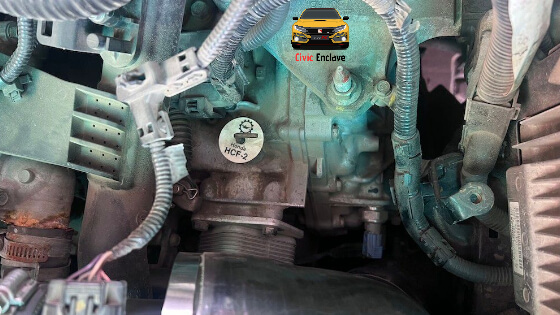The CVT transmission lasts around 250,000 miles in the Honda Civic without any issues, and you can get it changed after this if your CVT isn’t performing well. CVT longevity depends on your driving style and your car’s power.
CVT transmissions in Honda Civic last long unless you have modded or abused it by excessive gear changing. The mods can include ecu tune and performance hardware/bolt-ons. The failure of a CVT is a nightmare for Honda Civic owners, and they should always take precautions to avoid that.
As of 2023, the CVT transmission for the Honda Civic costs around $2000 + $2300 labor for the 10th gen and $5000+ for the 11th gen.
What are the factors that affect the longevity of CVT?
1. Gear Oil Leakage
Don’t forget to check for any transmission oil leakage; the leakage can take the CVT out once the oil is below the level.
2. Launching/Brake Boosting
You will see a massive change in the launch and gear shifting of the car once the CVT gets weak.
3. Driving Style
If your driving habits are abusing the CVT, there will be more chances of CVT failure
4. Car’s Torque
Higher torque can be affected by mis-shifting the gear when the power is highest.
5. Tire/Wheel Spin
Keep the wheel spin as low as possible to avoid rpm bounce.
How to prevent CVT failure in Honda Civic 10th & 11th generation?

1. Change Gear Oil Timely
Always keep an eye on the gear oil and get it changed promptly. The regular schedule for gear oil change is 25,000 miles, but if your car is tuned, try to get changed early at 20-22,000 miles. Let’s have a look at some symptoms of gear oil change
- Open the gear oil cap and smell the oil. If the smell is terrible, the gear oil needs to be changed
- The car starts making a whining sound after high-speed runs
- There is a lag in the gear-shifting
- You will see a light on the meter.
- A bad burning Smell is there
2. Avoid doing Launch/Brake boosting too much
Launching the car from 0, again and again, puts pressure on the CVT, and there might be chances of CVT failure. If you are racing or checking time, try to complete the job in 2-3 runs. When a car is launched, a high-speed jumps to the CVT, forcing it to move and change gears. Aggressive driving, frequent stop-and-go traffic, and heavy towing can stress a CVT and reduce its life.
3. Get a KTuner
KTuner is an ECU tuning device that tunes the ECU and tells you the hidden performance statistics of the Honda Civic. It shows the transmission temperature that helps you monitor the CVT. Avoid pushing the car above the limits when the transmission temperature is above 100 degrees. If you live in a cold region, there are fewer chances of the CVT temperature going high.
4. Avoid going over 380BHP
Try to keep the car’s power to the limit the CVT can afford. The CVT can be taken to 380BHP; however, by checking all temperatures and regular gear maintenance
5. Use good tires
Tires play an essential role in the launch and hence CVT of the civic. If the tires aren’t good, there will be more wheel spin, which will bounce the CVT. The bouncing of the CVT makes a good chance of CVT failure. Use slicks or sports tires and avoid slippery roads to protect the CVT.
Remember, Honda gives a warranty of 3-5 years or 30,000 miles, so if your CVT fails, get it claimed if your warranty is still intact.
FAQs – Frequently Asked Questions
1. Is the 10th-generation Civic CVT reliable?
Yes, the 10th-generation Civic is more reliable than the 11th-generation. The CVT transmission has more power in it. The newer models 2019-2021 have an upgraded CVT transmission, which is more secure without any issues.
Regarding the 11th generation, its CVT is weaker than the 10th generation. The CVT bounces off more often. Two close friends of mine lost their CVTs because of CVTs bouncing off. However, they were lucky enough to get it claimed in warranty.
2. Can a CVT transmission last 200,000 miles?
Yes, many people have taken their CVTs to 204,000 miles without issues. Just keep the oils changed and up to date and avoid abusive driving habits.
3. Do CVT transmissions wear out faster?
They do if your car is tuned with a performance parts upgrade. High torque can lead to CVT wearing out faster.
Conclusion
That’s all about the Honda Civic CVT Transmission. Take the precautions to avoid failure, and you are good to go. Avoid abusive driving, maintain the car weekly, and use good tires. Let me know what you think in the comment section.

